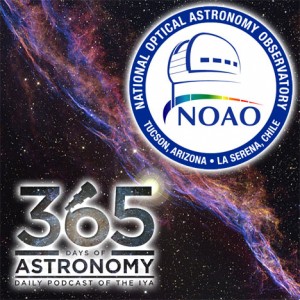Podcaster: Rob Sparks & Dr. Verne V. Smith
Organization: NOAO
Links: www.noao.edu ; @NOAONorth; http://www.gemini.edu/; https://www.facebook.com/GeminiObservatory
Description: The Gemini Observatory is an international collaboration that runs twin 8.1 meter telescopes, one located on the island of Hawaii and the other on Cerro Pachon in Chile. In this podcast, Dr. Verne Smith discusses the collaboration, the Gemini telescopes and their instruments.
Bio: Rob Sparks is a science education specialist in the Education and Public Outreach (EPO) group at the National Optical Astronomy Observatory (NOAO) and works on the Galileoscope project (www.galileoscope.org), providing design, dissemination and professional development. He blogs at halfastro.wordpress.com.
Dr. Verne V. Smith received a B.A. in Physics & Astronomy in 1976 followed by an M.S. in Physics in 1978, both at the University of Iowa. In 1983 he finished a Ph.D. in astronomy at the University of Washington. This was followed by four years as a Robert A. Welch Postdoctoral Fellow at the University of Texas, after which time he became a Research Scientist at the University of Texas and McDonald Observatory. In 1996 he joined the faculty at the University of Texas at El Paso as a professor of physics & astronomy. Smith moved to NOAO in August 2004 as Deputy Director of the NOAO Gemini Science Center (NGSC) and in July 2006 became NGSC director. In 2008 he became an Associate Director of NOAO for the System Science Center (NSSC). His research interests center on the astrophysical origins of the chemical elements, nuclear astrophysics, high-resolution spectroscopy, stellar atmospheres, stellar evolution, and galactic chemical evolution.
End of podcast:
365 Days of Astronomy
=====================
The 365 Days of Astronomy Podcast is produced by NUCLIO. Audio post-production by Richard Drumm. Bandwidth donated by libsyn.com and wizzard media. You may reproduce and distribute this audio for non-commercial purposes. Please consider supporting the podcast with a few dollars (or Euros!). Visit us on the web at 365DaysOfAstronomy.org or email us at info@365DaysOfAstronomy.org. This year we celebrate cosmic light as light is our info messenger in the universe. Join us and share your story to celebrate the International Year of Light. Until tomorrow! Goodbye!



Trackbacks/Pingbacks